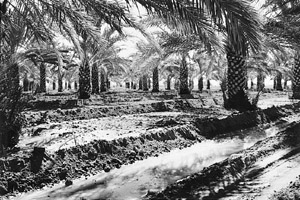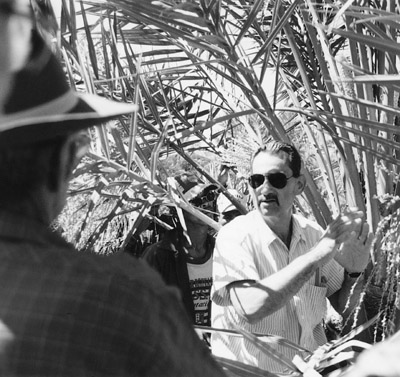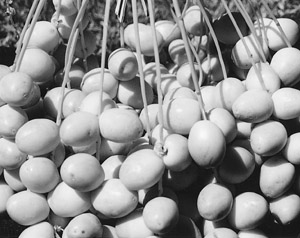


M. Eran Korati, spécialiste des palmiers dattiers originaire d'Israël - l'un des pays producteurs de palmiersdattiers parmi les plus avancés sur le plan technique - s'est rendu dans le cadre d'une mission de CTPD en Namibie, pays qui cultive depuis peu cet arbre de façon intensive.
L'expert a participé à l'organisation d'un cours de formation de deux jours intitulé «Calendrier technique du palmier dattier» à Keetsmanshoop, dans le sud-ouest de la Namibie. Des cours de formation sur différentes aspects de la culture du palmier dattier se tiennent tous les ans depuis 1996 dans le cadre d'un projet financé par l'État pour promouvoir la production de dattes en Namibie. La FAO fournit une assistance technique au projet.
Eran Korati, experto en la palma datilera oriundo de Israel, uno de los productores técnicamente más avanzados de este tipo de palma en el mundo realizó una misión de CTPD a Namibia, país que ha comenzado últimamente a producir este cultivo en plan intensivo.
Dicho experto ayudó a impartir un cursillo de capacitación de dos días de duración en Keetsmanshoop, lugar situado en el sudeste de Namibia, cuyo título era «Calendario técnico de la palma datilera». Desde 1996 cada año se han organizando cursillos de capacitación sobre distintos aspectos del cultivo de esta palmera, que forman parte de un proyecto de financiación estatal para fomentar la producción de dátiles en Namibia. La FAO aporta su asistencia técnica al proyecto.
![]()
Eran Korati, a date-palm expert from Israel, one of the most technologically advanced date-palm producing countries in the world, undertook a TCDC mission to Namibia, which has recently  embarked on intensive date-palm production. The expert helped teach a two-day training course in Keetsmanshoop, in southwestern Namibia, entitled "Date Palm Technical Calendar". Training courses on different aspects of date cultivation have been held annually since 1996 and form part of a government-funded project to promote date production in Namibia. FAO provides technical assistance to the project.
embarked on intensive date-palm production. The expert helped teach a two-day training course in Keetsmanshoop, in southwestern Namibia, entitled "Date Palm Technical Calendar". Training courses on different aspects of date cultivation have been held annually since 1996 and form part of a government-funded project to promote date production in Namibia. FAO provides technical assistance to the project.
The Namibian Government views the date-palm as a crop with considerable potential, both for the domestic market and for export. Dates are a very good source of energy and nutrients and the arid Namibian terrain provides a growing environment for the crop which is largely free from major date pests and diseases. Located in the Southern Hemisphere, Namibia also has the advantage of being able to sell its fresh produce out of season in the Northern Hemisphere.
The project has already planted about 80 ha with internationally

Israeli expert Eran Korati demonstrating some aspects of date-palm cultivation |
The two-day training course aims to train date-palm technicians in all aspects of cultivation of the crop. In 1997, the course was internationalized utilizing the services of TCDC experts and the participation of farmers and technicians from Botswana,  South Africa and Zimbabwe as well as Namibia. While growers are eager to set up date farms and understand the potential of the crop, they are worried about their lack of practical experience with date harvesting and post-harvest handling.
South Africa and Zimbabwe as well as Namibia. While growers are eager to set up date farms and understand the potential of the crop, they are worried about their lack of practical experience with date harvesting and post-harvest handling.
During the course, the expert covered sorting and packaging, quality control, food standards and marketing, as well as date production to meet export standards. Namibian growers consider the lack of central packaging facilities, local marketing channels and knowledge of the size of local markets as further constraints. Another major problem that needs to be addressed at the national level is how to meet international food quality control standards.
The course also included a field visit to a date-palm nursery and plantations in the locality (the Naute Dam Project). In addition to his technical contribution to the course, the expert visited other sites where date-palms are grown and the project's tissue-culture laboratory at Windhoek. From his observations during these visits, the expert made recommendations on the cultivation, harvesting, transport, fruit drying, warehousing and temperature maintenance during transport and storage. He also recommended a new data collection methodology that will provide information on plantation production to be used in crop evaluation for growers' marketing plans.